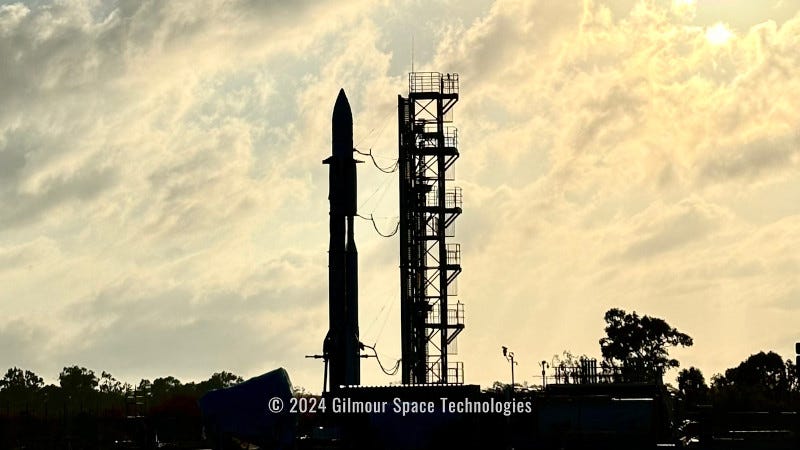Three of our top stories came literally from the far side of the planet from JSC HQ this week. For starters, Australia's Minister for Industry and Science, Ed Husic MP, and the Australian Space Agency granted the country’s first orbital launch permit to Gilmour Space Technologies for its maiden Eris rocket launch from the Bowen Orbital Spaceport in north Queensland.
The upcoming TestFlight1 will be the first of several planned test launches to reach orbit with Eris, which leverages new propulsion technologies developed by the Gold Coast-based company.
An Australian launch permit is required under the Space (Launches & Returns) Act 2018 to launch an object from Australia to an altitude of over 100 kilometers (≈62 miles). It comes with a number of conditions that must be met before launch, and a mandatory 30-day notification period.
-0-
Meanwhile, the Australian Ministry of Defense canceled a satellite procurement contract with Lockheed Martin, citing the evolving nature of the space domain.
In a statement released to the media, the Australian MoD said that, "as outlined in the 2024 National Defense Strategy, Defense requires space capabilities that enhance intelligence, surveillance and reconnaissance, provide resilient communications and counter emerging space threats. The Integrated Investment Program included $9-$12 billion to invest in enhanced space capabilities.
The MoD said in the statement that it was canceling the agreement with Lockheed Martin Australia for a single orbit GEO-based satellite communications system, while stressing that Lockheed Martin Australia continues to be a highly valued industry partner, supporting Defense’s requirements for contemporary and future capability demands.
Instead of a single orbit solution, the agency will focus on a multi-orbit capability increasing resilience for the Australian Defense Force.
-0-
Across the Tasman Sea in New Zealand, Rocket Lab launched its 54th Electron rocket, carrying a payload for a "confidential customer" into orbit. The mission was Rocket Lab’s 12th Electron launch this year, continuing to best the Company’s previous record of 10 annual launches achieved in 2023.
The ‘Changes in Attitudes, Changes in Latitudes’ mission launched from Rocket Lab Launch Complex 1 in Mahia, New Zealand on November 5th, 2024, less than ten weeks from the mission’s launch contract signing, making it one of the company’s fastest turnarounds yet from contract to launch.
It has been typical for years to pass between contract and launch. Rocket Lab says its Electron rocket now makes it possible for customers to book and launch in just weeks, enabling them to test technologies faster, begin generating revenue from constellations earlier, or gather urgent data from orbit at near on-demand timelines.
-0-
On the financial front, Redwire Corporation announced results for its third quarter ended September 30, 2024.
According to a news release, revenues for the third quarter of 2024 increased 9.6% to $68.6 million, as compared to $62.6 million for the third quarter of 2023. Net Loss for the third quarter of 2024 increased by $14.6 million to $(21.0) million, as compared to $(6.3) million for the third quarter of 2023. Net Loss for the third quarter of 2024 includes a loss contingency of $8.0 million related to the Lemen v. Redwire Corp. securities lawsuit, of which there is no comparable cost for the third quarter of 2023.
Adjusted EBITDA for the third quarter of 2024 decreased by $2.5 million to $2.4 million, as compared to $4.9 million for the third quarter of 2023.
For the full year ending December 31, 2024, Redwire affirms that it is forecasting revenues of $310 million.
-0-
And Viasat has released its Second Quarter Fiscal Year 2025 (Q2 FY25) financial results in a letter to shareholders posted on the company website.
According to the letter, the Q2 FY25 results were better than expected in terms of revenue and Adjusted EBITDA performance, reflecting continued demand for Viasat's technology solutions and strong results in Defense and Advanced Technologies (DAT).
At the halfway point of the fiscal year, Viasat CEO Mark Dankberg says that for FY2025 the company expects mid-single-digit YoY Adjusted EBITDA growth excluding the one-time benefits from the litigation settlement of $86 million in Q2 FY2024, off a reference base of FY2024 Combined Adjusted EBITDA of $1.5 billion. The Combined Adjusted EBITDA growth is expected to be driven by strong revenue flow through from DAT licensing agreements and Communication Services.
Looking ahead to FY2026, Dankberg says he expects that YoY revenue and Adjusted EBITDA growth – and the two-year cumulative capex number is expected to remain net neutral which indicates ultimately the same for cash through FY2026.

















